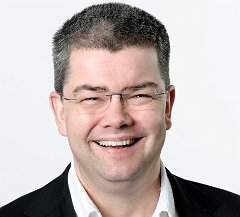Inferring Input Structure for Machine LearningKeynote
New combinations of test generation and program analysis make it feasible to automatically infer models for the input language of a program – such as, for instance, extracting a JSON grammar from an appropriate parser. This paves the way towards simple identification of lexical and syntactical entities in program input and communication, which in turn can be used as features for machine learning tasks such as (1) classification (e.g. for identifying abnormal or malicious inputs, or identifying elements related to a failure) or (2) synthesis (e.g. for automatic input repairs). The talk includes live demos of grammar mining and input classification.
Bio: Andreas Zeller is Faculty at the Center for IT-Security, Privacy, and Accountability (CISPA), and professor for Software Engineering at Saarland University, both in Saarbrücken, Germany. His research concerns the analysis of large software systems and their development process. In 2010, Zeller was inducted as Fellow of the ACM for his contributions to automated debugging and mining software archives, for which he also obtained the ACM SIGSOFT Outstanding Research Award, in 2018. His current work combines test generation and specification mining, funded by grants from the European Research Council (ERC).
Andreas Zeller is Faculty at the Center for IT-Security, Privacy, and Accountability (CISPA), and professor for Software Engineering at Saarland University, both in Saarbrücken, Germany. His research concerns the analysis of large software systems and their development process. In 2010, Zeller was inducted as Fellow of the ACM for his contributions to automated debugging and mining software archives, for which he also was awarded 10-year impact awards from ACM SIGSOFT and ICSE. In 2011, he received an ERC Advanced Grant, Europe’s highest and most prestigious individual research grant, for work on specification mining and test case generation. In 2013, Zeller co-founded Testfabrik AG, a start-up on automatic testing of Web applications, where he chairs the supervisory board. In 2018, he received the highest research award of ACM SIGSOFT, the Outstanding Research Award.
Wed 18 JulDisplayed time zone: Amsterdam, Berlin, Bern, Rome, Stockholm, Vienna change
11:00 - 12:30 | Session #1ML4PL at Bangkok Chair(s): Hila Peleg Technion, Israel, Artem Pelenitsyn Czech Technical University in Prague | ||
11:00 60mTalk | Inferring Input Structure for Machine LearningKeynote ML4PL Andreas Zeller Saarland University | ||
12:00 30mTalk | On the Importance of Common Sense in Program Synthesis ML4PL Hila Peleg Technion, Israel | ||
